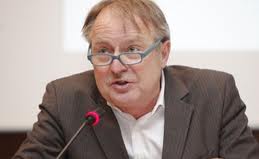By Andrew Warshaw
November 6 – The international players’ union FIFPro have re-iterated their warning that players could boycott the 2022 World Cup if it is held in summer even though that is now becoming increasingly unlikely.
FIFPro Secretary-general Theo van Seggelen (pictured) said his organisation would advise its members not to take part if the traditional June-July World Cup slot is maintained by FIFA in Qatar.
“We will take all necessary measures,” Van Seggelen told the BBC – and included a May World Cup, favoured by the clubs in order to avoid a massive upheaval over as many as three seasons, in that threat.
“They are asking too much,” said van Seggelen. “The health and safety of the players is always more important than the financial and commercial interests of the clubs.”
Van Seggelen joined other stakeholders at this week’s meeting of the FIFA Task Force that is conducting a feasibility study into exactly when to stage 2022.
He believes the best option is November-December – one of two winter periods on the table – even though a growing number of experts believe that would be nigh-on impossible due to the tight international calendar in both hemispheres plus the fact that there would be not nearly enough time to fit in a month-long tournament as well as two weeks of preparation before breaking for Christmas.
As more and more voices are heard over the winter versus summer debate, UEFA president Michel Platini’s latest comments can only be construed as being rather like a broken record.
On a courtesy visit to the English Football Association on Wednesday, when he was shown around the state-of-the-art national training centre at St Georges Park, Platini said for the umpteenth time that the 2022 World Cup must be staged in winter.
“It’ll never be in April, May or June. It will be in winter,” said Platini. “It’s not the clubs that are playing, it’s the players and it’s not possible to play in May when it’s 40 degrees.”
Media organisations flagged up his remarks as some grand new revelation when in fact he had said the same thing countless times before.
What IS significant, however, is that Platini’s views put him on a collision course with those of Europe’s clubs who provide 75% of the players who appear at the World Cup finals.
Nor do his remarks appear to take into account that the global calendar – not just the European schedule – would have to be overhauled completely to accommodate the World Cup if it is staged in November-December as distinct from January-February, a point raised in an interview with this website by Harold Mayne-Nicholls who led the official inspection team that evaluated the credentials of 2018 and 2022 World Cup candidates and reported back to FIFA before the vote four years ago.
What IS newsworthy in Platini’s latest remarks is his willingness to push back the dates of the semifinals and final of UEFA’s two flagship competitions – the Champions League and Europa League – to allow for the Qatar World Cup. But his support for winter per se is as old as the hills.
Contact the writer of this story at moc.l1745192370labto1745192370ofdlr1745192370owedi1745192370sni@w1745192370ahsra1745192370w.wer1745192370dna1745192370

